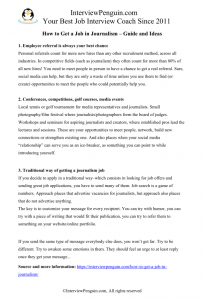You will hardly find any entry-level jobs in journalism. What is more, news rooms lack in cultural and ethic diversity, and most starters are heavily underpaid. Surely, you can apply for an unpaid internship or fellowship, but only if you can afford having a second job (and working from morning to night), or if you your parents still feed you.
Journalism is one of the hardest fields to get into. To make things worse, small newspapers and magazines (a typical place where one would start their career in journalism) are struggling to survive, or already out of business.
Surely, you can always get a job of a content writer or editor in some low-quality online news portal, but that’s not true journalism, and not something you want to do with your degree and passion for quality work. And such a reference won’t help you to get a real journalism job anyway.
In this article we will look at some ways of improving your chances of signing that coveted job contract.
Table of Contents
Employee referral is always your best chance
Personal referrals count for more new hires than any other recruitment method, across all industries. In competitive fields (such as journalism) they often count for more than 80% of all new hires!
You need to know people to get in. But that’s probably nothing new for you. Most aspiring journalists follow their role models on social media, comment, try to get noticed. That’s how things work in 21st century–we know people without really knowing them… at least most people think so.
However, once you are one of 100s students following and commenting this or that reporter from CNN (or any other mass media), you’re not going to get one step closer to their offices…
You need to meet people in person to have a chance to get a real referral. Sure, social media can help, but they are only a waste of time unless you use them to find (or create) opportunities to meet the people who could potentially help you.
Conferences, competitions, golf courses, media events
Local tennis or golf tournament for media representatives and journalists. Small photography/film festival where journalists/photographers form the board of judges. Workshops and seminars for aspiring journalists and creators, where established pros lead the lectures and sessions.
These are your opportunities to meet people, network, build new connections or strengthen existing one. And also places when your social media “relationship” can serve you as an ice-breaker, as something you can point to while introducing yourself.
I’ve been commenting your work at XYZ.com, and we had a nice discussion following your article about ABC topic. Marla, you remember?
Acquaintances from school
Some of your schoolmates might be more lucky. They already got their first journalism job. What’s more, that newspaper or local TV with a strange name you’ve never heard about is doing great, and growing. Why wouldn’t they recommend you as the new acquisition for the existing team of reporters?
Former classmates, teachers, other folks from the university. Search their names on Facebook and LinkedIn and check how they are doing. If you had a good relationship together, they may arrange an interview for you. Better than nothing. If you had a bad relationship, however … you can skip this one.
Game of numbers–traditional way of getting a journalism job
You can probably imagine the number job applications they get in each newspaper or TV. Way too many, and some fools will even offer to work for them for free (spoiling the entire market).
If you decide to apply in a traditional way–which consists in looking for job offers and sending great job applications, you have to send many of them. Job search is a game of numbers. Approach places that advertise vacancies for journalists, but approach also places that do not advertise anything.
You’ve probably heard of JK Rowling. She was rejected by 12 publishers before finding success with Harry Potter. And what a great talent she had! Now take it as an inspiration, and do not take personally if someone rejects you, or doesn’t reply to you at all (which will be the case in 8 out of 10 applications you will send out).
Customize your message and try to stand out
If they see your email and immediately know that you sent the same message (with some minor modification) to 50 other publishing houses, media agencies, newspapers or TVs, you can be almost sure they won’t even reply to you.
However, when you point out something specific–such as why you’d fit their team, or their best works in your view and how you could contribute to them, or why it would be great for them to have you onboard, or just praise the likely recipient of your message for something they did (their latest controversial article), your chances of getting a reply will improve immensely.
Standing out is crucial, try unorthodox strategies
Feel free to experiment. You can try with humor, you can try with a piece of writing that would fit their publication, you can try to refer them to something on your website/online portfolio.
If you send the same type of message everybody else does, you won’t get far. Try to be different. Try to awaken some emotions in them. They should feel an urge to at least reply once they get your message.
You can even try sending the same application (or a different one) each week, until they reply. That’s the email marketing strategy of many big players, simply becasue it does work. Everyone gets tired of getting the same message each week, from the same person. They will eventually reply (even if negatively), just to be done with it for good.
Be ready when your chance arrives, prepare for the interview
Whether you spend your days crafting customized job applications and mailing them all around the country, or hanging around on social media, trying to find the opportunity to meet in person someone who could help you, you should also get ready to make the most out of your chance–when it finally arrives.
If you are persistent, and continue trying, you will eventually get an interview. It can be both easy and difficult, depending on the place and the interviewers. Be sure to check our article about journalist interview questions, and get ready for the tricky questions you may face.
You should also have a portfolio ready anytime (at least on your smartphone). When someone from the industry finally asks you to show them some of your work, you should be able to show them your very best works. Right then, on the spot, when they can immediately look at it and see what a great talent you are.
Sending an email on the next day is way too late--because they aren’t standing next to you, becasue they have dozens of other things on their mind, becasue they’ve already forgotten you. You must act on the spot, when you finally get the chance.
* Special Tip: You can also download the summary of the article in a one page long PDF, and refer to it anytime later:

Conclusion and next steps
Journalism is one of the most difficult fields to get into, at least when we talk about jobs that pay well, and can realistically feed you. Vast majority of university graduates end up working in a completely different field (marketing, PR, sales).
However, exception always proves the rule, and there are always some exceptions. If you are persistent, if you build contacts in the industry, if you send creative and customized job applications, and if you are ready to ace your interview (when you finally get one), you can definitely make it. I wish you good luck!
May also interest you:


